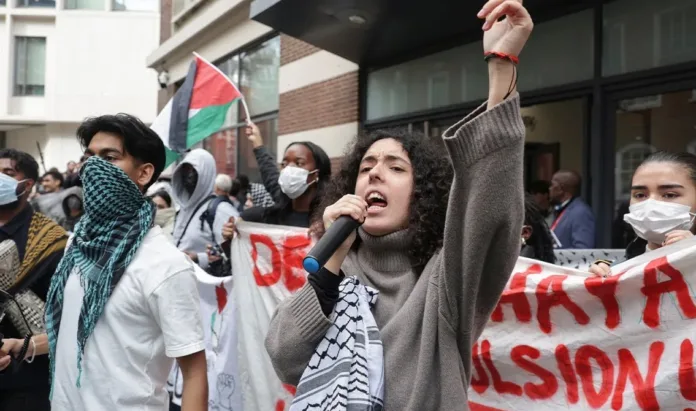Demonstrators in London, Sydney, and Paris rally as Gaza war fuels rising global tensions
Anti-Israel protests took place across multiple continents on Tuesday, marking the second anniversary of Hamas’s October 7 massacre in southern Israel — the deadliest day for Jews since the Holocaust and the event that triggered the ongoing war in Gaza.
Large rallies and marches were held in London, Sydney, Paris, Geneva, Athens, Istanbul, Tokyo, Jakarta, and Stockholm, among other cities, with demonstrators waving Palestinian flags and chanting slogans accusing Israel of war crimes. In several locations, smaller counter-protests were also organised by pro-Israel groups holding vigils for the victims of Hamas’s 2023 attack.
The demonstrations highlight a clear shift in global sentiment since the start of the war. While initial outrage following Hamas’s killing of around 1,200 people in Israel generated widespread sympathy for the Jewish state, much of that support has eroded as Israel’s prolonged military campaign in Gaza has left tens of thousands dead and devastated much of the territory.
In London, students from several universities walked out of classes at 2 p.m. before marching through the city centre. Outside King’s College London, protesters chanted “Israel is a terrorist state” and carried placards calling for an end to “genocide in Gaza.” Some participants also criticised Prime Minister Sir Keir Starmer, who had urged students earlier in the week not to protest on the anniversary, calling such demonstrations “un-British.”
Mark Etkind, a 60-year-old Londoner wearing a sign declaring himself “the son of a Holocaust survivor,” said he supported the marchers. “I have always opposed genocide,” he told reporters. “I support students who are actively opposing genocide.”
Not everyone shared that view. Israeli activist Emily Schrader, visiting London, described the protests as “utterly disgraceful,” arguing that they embolden extremists. “There are much better ways to support Palestinians than taking part in demonstrations that are so hurtful and so deeply offensive,” she said.
Across the UK, other cities including Edinburgh, Glasgow, Sheffield and Manchester saw planned rallies and vigils. Manchester remains on high alert after two people were killed last week when a terrorist attacked a synagogue on Yom Kippur, prompting police and political leaders to appeal for restraint.
In Melbourne, pro-Hamas graffiti appeared overnight in several neighbourhoods, with slogans such as “Glory to Hamas” and “Oct 7 do it again” spray-painted on walls and billboards. Victoria Premier Jacinta Allan condemned the vandalism as “deeply wrong and offensive,” while Prime Minister Anthony Albanese called it “abhorrent.” Australia’s deputy prime minister, Richard Marles, said the acts could be investigated as potential terror offences.
Elsewhere, tensions flared across Europe. In Amsterdam, activists splashed red paint across the Royal Palace to protest the city’s decision to ban an anti-Israel rally while allowing a pro-Israel vigil. In Bologna, Italy, authorities pre-emptively banned all public demonstrations after several days of violent clashes between protesters and police.
Meanwhile, in India, demonstrators in Kolkata burned an effigy depicting US President Donald Trump and Israeli Prime Minister Benjamin Netanyahu, while in Turkey, protesters targeted an energy company over its exports to Israel.
Not all events were confrontational. In Berlin, mourners gathered in front of the Brandenburg Gate for a solemn vigil organised by the Jewish Student Union Germany, placing over 1,000 empty chairs bearing photos of those murdered or kidnapped by Hamas in 2023. Similar memorials took place in Israel and at Columbia University in New York, where student groups displayed 1,200 seats to honour the victims.
Organisers of pro-Palestinian demonstrations said their aim was to draw attention to the ongoing humanitarian crisis in Gaza and to advocate for Palestinian rights. However, officials in several countries warned that staging protests on October 7 risked being interpreted as glorifying terrorism.
The global wave of demonstrations underscores how two years after the Hamas attacks, the conflict continues to polarise public opinion — deepening divides over war, justice, and memory.
